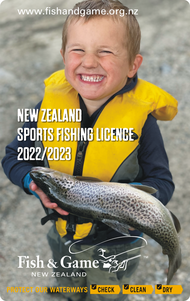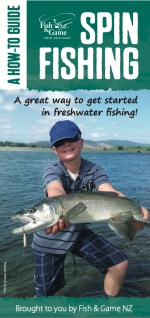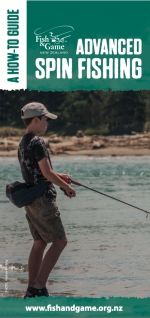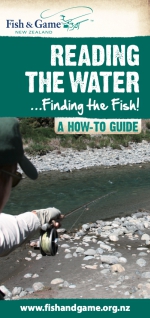There's no better way to enjoy New Zealand's outdoors than with a fishing rod in your hand.
New Zealand has the best trout fishing spots in the world and you don't have to go far to find them.
Get started in 5 easy steps:
1 |
Buy your licence |
|
2 |
Pick your spot |
|
3 |
Get your gear sorted |
|
4 |
Tweak your technique |
|
5 |
Get Fishing! |
11 - Get your Licence
Depending on how long your want to fish, we have fishing licences to suit - from a single day to all season long.
PURCHASE YOUR FISHING LICENCE HERE

22 - Pick your spot
With so many places in New Zealand to choose from, here are a few spots that are easy to get to and offer a great chance of catching a trout.
- North Island Park & Cast access points
- South Island Park & Cast access points
- Full list of NZ access points
3Get your gear sorted
Getting just the basics right will increase your chances of success enormously.
Reel
The reel is the most important part of a spinning outfit and, like most things in life, you get what you pay for, but they don't have to be expensive. Buy the best you can afford. Get a right or left-hand wind model as suits you. For instance, if you hold the rod right handed you may want a left hand wind reel, you will figure out what feels right for you. The essentials for a good reel are smooth operation, light weight and a large enough to carry sufficient line.
Rod
The rod should be around two metres long and designed to cast a lure weighing 7-10gms. Guides lined with ceramic are preferable to chromed wire ones to reduce line wear. The price of a rod varies considerably according to the material it is made from and again buy the best you can afford.
Line
Use a line with 3-4kg breaking strain. Such a line should be capable of landing most fish in all but the toughest conditions.
Trace
A small spool of nylon of a slightly lower breaking strain than the main line is a good place to start. A short piece of this thinner line is connected to the main line by a small swivel, which prevents spinning lures from kinking the main line. The other end of the trace is tied directly to the lure. This prevents the loss of the main line when a lure becomes irretrievably snagged (it does happen).
Some helpful links for trout fishing beginners
Don't forget your licence!
PURCHASE YOUR FISHING LICENCE HERE
4Tweak your technique
Start with spinning
Spin fishing is fishing for trout with lures that imitate small fish. It is an ideal way to begin trout fishing as the skills involved are easy to pick up. A basic outfit of rod, reel and line, plus a few lures are all that is necessary to give you a good chance of catching trout.
The knowledge of the water and trout habits learned while spin fishing is the perfect grounding if you move on to other methods like fly-fishing, or jigging from a boat.
Popular lures include a black and gold ‘toby’ or Rapala and more recently soft baits have gained a following. Lures are cast out and then retrieved to imitate a small swimming fish, a staple food for trout.
There can be a bit to learn, but you can be successful with limited experience. We have chosen the most important things to know and listed them here so you can get up and running quickly. Listed below are some links to other web pages on this site, YouTube clips and PDF brochures. Take a little bit of time to watch and read them and you will be catching fish before you know it.

5Get fishing!
You will need one of these and there are 9 different licences from one day through to the whole year. The best value will always be the whole season, as it allows you to fish whenever you want.
You will need to sign your licence and carry it with you at all times when fishing. Stick to the rules and have a great time.
BUY ONE ONLINE
Important information
Regulations
There are a few things to know before you head out. Fishing for trout in New Zealand is regulated by Fish & Game and there are some things you can and can't do while fishing, so a scan of the regulations is advised. You may get one of these booklets with your licence or click on the one you want to download below to get a PDF.
Fish & Game have a number of rangers which you may meet while out fishing and you will need to produce your licence on request. Many of our rangers are anglers too, so make sure you get some tips from them.


